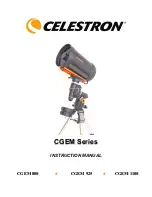
14
B
B
a
a
l
l
a
a
n
n
c
c
i
i
n
n
g
g
t
t
h
h
e
e
M
M
o
o
u
u
n
n
t
t
i
i
n
n
D
D
E
E
C
C
Although the telescope does not track in declination, the telescope should also be balanced in this axis to prevent any sudden
motions when the DEC lock lever is loose. To balance the telescope in DEC:
1.
Loosen the R.A. clutch lock lever and rotate the telescope so that it is on one side of the mount (i.e., as described
in the previous section on “Balancing the Mount in R.A.”).
2.
Tighten the R.A. lock lever to hold the telescope in place.
3.
Loosen the DEC clutch lock lever and rotate the telescope until the tube is parallel to the ground.
4.
Release the tube —
GRADUALLY
— to see which way it rotates around the declination axis.
DO NOT LET
GO OF THE TELESCOPE TUBE COMPLETELY!
5.
Slightly loosen the knobs that holds the telescope to the mounting platform and slide the telescope either forward
or backward until it remains stationary when the DEC clutch is loose. Do NOT let go of the telescope tube while
the knob on the mounting platform is loose. It may be necessary to rotate the telescope so that the counterweight
bar is pointing down before loosening the mounting platform screw.
6.
Tighten the knobs on the telescope mounting platform to hold the telescope in place.
Like R.A. balance, these are general balance instructions and will reduce undue stress on the mount. When taking
astrophotographs, this balance process should be done for the specific area at which the telescope is pointing.
A
A
d
d
j
j
u
u
s
s
t
t
i
i
n
n
g
g
t
t
h
h
e
e
M
M
o
o
u
u
n
n
t
t
In order for a motor drive to track accurately, the telescope’s axis of rotation must be parallel to the Earth’s axis of rotation, a
process known as polar alignment. Polar alignment is achieved NOT by moving the telescope in R.A. or DEC, but by
adjusting the mount vertically, which is called altitude, and horizontally, which is called azimuth. This section simply covers
the correct movement of the telescope during the polar alignment process. The actual process of polar alignment, that is
making the telescope’s axis of rotation parallel to the Earth’s, is described later in this manual in the section on “
Polar
Alignment.”
Adjusting the Mount in Altitude
•
To increase (raise) the latitude of the polar axis,
turn the rear latitude adjustment knob and
loosen the front screw (if necessary).
•
To decrease (lower) the latitude of the polar
axis, turn the rear latitude adjustment knob and
tighten the front screw (if necessary).
Figure 2-14
Figure 2-15
Rear Latitude
Adjustment
Knob
Front
Latitude
Adjustment
Screw
Azimuth
Adjustment
Knob















































